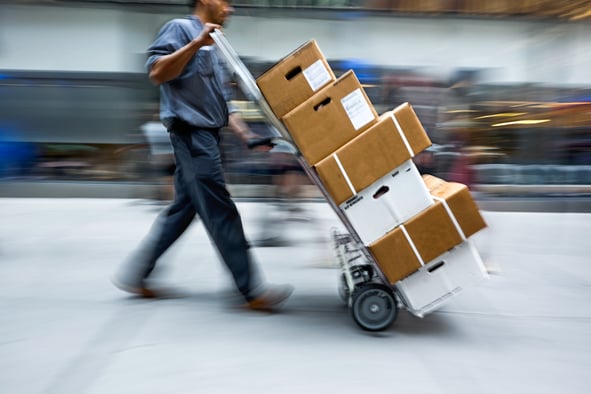Whether B2B or B2C, European e-commerce has been growing for years, most recently massively spurred by the Corona pandemic. But store operators, carriers, and consumers were subject to complicated VAT rules that were last updated in the EU in 1993. The EU's new VAT eCommerce package, which came into effect on July 1, 2021, aims to simplify cross-border commerce.
What is the VAT e-commerce digital package?
Twenty-eight years after the last update of the VAT, the EU introduces the VAT e-Commerce “digital package”, effective July 1, 2021, that adapts VAT to the e-commerce era. The stated goal here is to make cross-border business-to-consumer (B2C) e-commerce simpler and more fraud-proof through uniform VAT rules and digital tools.
At the same time, the new VAT will potentially provide EU member states with up to seven billion euros in increased tax revenue. The new rules change VAT obligations and their handling for the entire supply chain of online trade in goods sold from abroad to EU member states. Online retailers and marketplaces and their partners along the supply chain will therefore have to revise their VAT requirements and handling.

What changes with the new VAT e-commerce digital package?
With the new VAT for e-commerce, as of July 1, 2021, VAT liability applies equally to all online retailers. No matter where they are located within or outside the EU, and no matter the value of their shipment sent to the EU.
-
The EU has removed the previous thresholds for distance selling of goods and set a unified threshold of 10,000 euros.
-
The new One Stop Shop (OSS) expands the Mini One Stop Shop (MOSS).
-
The import VAT exemption for low-value goods of up to 22 euros was removed and the Import One Stop Shop (IOSS) was introduced.
-
Online marketplaces are considered sellers and are required to collect and report VAT.
-
New record-keeping requirements are introduced for online marketplaces facilitating the delivery of goods and services.
-
Establishment of special rules to simplify the import of goods with a value of less than €150 if the IOSS (Import One Stop Shop) is not used.
Who is affected by the changes to VAT?
New regulations affect the entire supply chain of online trade in goods imported from abroad into EU member states.
-
The EU's new VAT package affects all online retailers who sell goods into the EU through their own websites or through marketplaces.
-
Online marketplaces such as ebay, Amazon or AliExpress are in many cases responsible for collecting, reporting and paying VAT instead of their sellers.
-
Carriers also face new responsibilities. They must inspect all products for customs clearance and often collect the respective VAT for shipments from non-EU countries from recipients in the EU. This will require new systems or upgrades to existing systems.
-
Even EU-based consumers who purchase goods from abroad are also affected. As of July 1, 2021, consumers must be informed of the VAT included in the sales price during the ordering process. And this information must present on every invoice. VAT will be paid directly to the consumer's EU member state, with carriers in some cases collecting it directly from the buyer.

What is the One Stop Shop (OSS) and how does it work?
Online stores and market platforms that have their registered office in an EU member state have been able to register on the OSS - an extension of the Mini One Stop Shop in their national language since July 1. This registration applies to all EU member states, eliminating previous individual registrations for VAT in the 27 member states. According to the EU, via this electronic portal, the VAT per company for all goods and services imported into the EU member states will be calculated, accounted for, and paid to the respective member state quarterly.
What is the Import One Stop Shop (IOSS) and how does it work?
The IOSS is for e-commerce companies from non-EU countries that ship their goods to an EU country or import goods from EU sellers into the EU from a foreign country. By registering on the portal, each business can calculate, declare, and pay the VAT due and applicable for all 27 member states, rather than the buyer paying the VAT when the goods are imported. However, the IOSS only covers the sale of goods that are shipped or transported from outside the EU at the time of purchase and contains a shipment value of goods up to the duty-free limit of 150 euros. In addition, the goods must not be subject to excise duties usually levied on alcohol or tobacco products.
An electronic customs declaration for each shipment from a third country is required. Above a threshold of 150 euros per shipment imported into the EU, e-commerce merchants from non-EU countries will be subject to the customs duties applicable in the respective EU member state, as before, according to customs. E-commerce companies from non-EU countries not registered in the IOSS can have the customs declaration and the handling of the fees realized via the delivering carriers.
How does VAT handling work without IOSS registration?
As it is not mandatory, there is a special provision for e-commerce businesses from non-EU countries that do not want to register in the IOSS. According to the EU, for foreign sales of imported goods in shipments not exceeding 150 EUR, so-called intermediaries can take over the registration on the portal and thus the handling of VAT. The respective delivering carriers can act as IOSS intermediaries. They collect the VAT revenue per month per seller and transfer the payments to the relevant EU member state in the following month.
Seamlessly continue oversees delivery with the right carrier mix
Uniform taxation for EU and non-EU online stores, the same thresholds in all EU countries, and digital platforms create clearer structures and new tools for cross-border trade in the digital age. Despite the standardization of values and simplification of processes, cross-border e-commerce is not without complications for individual players in the European market. Carriers are becoming even more important - not least through their new potential intermediary role in the IOSS portal.
With its wide carrier network and expert partners, Seven Senders can help e-commerce retailers maintain seamless shipping and delivery processes so they can focus on growing their business across borders. Get in touch to find out how we can help you avoid shipping delays and reduce the impact of the VAT eCommerce changes with our end-to-end parcel shipping services.